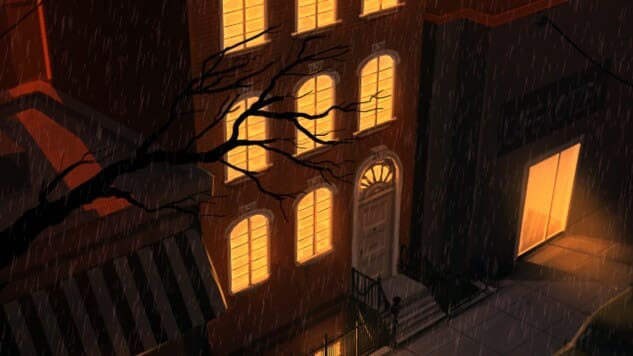
Unavowed starts strong and doesn’t really stop. Or, it starts as strong as any point-and-click adventure game can, with a high-stakes dialogue interaction followed by some tense puzzle solving. And even for WadjetEye, the studio behind the game who’ve been working on authentic, ‘90s-style point-and-click adventure games for the past twelve years, it’s an impressive feat of an opening. There’s lightning, and an otherworldly demon, and you get to flip a switch after setting up a short Rube Goldberg-style trap that fries your assailant. It’s everything you could want from a point-and-click opening, in other words.
The newest game by the studio, Unavowed is a masterful example of a classic genre taking cues from more modern games. The interactions between crew members and the game’s mission structure feel more than a little influenced by Bioware (especially Mass Effect and Dragon Age), but not too copycat in their approach. In many ways, it feels like a deconstruction of a design that is most often seen in huge-budget AAA games down to its most essential components: The missions, the crew, and the interactions between them.
The game follows you, the player, a new recruit of the Unavowed, a team of supernatural defenders out to defend New York City from whatever forces may threaten it. It’s a small, tight-knit group, and the game is simplistic enough in its design that it makes interacting with them between missions into part of the game’s overall experience.
I found myself spending as much time as I could between missions weeding out every bit of dialogue I could from my crewmates. There’s Eli, the reluctant fire mage, whose great-grandfather was so powerful he inspired an entire counter-force of fae just to stop him; and Mandana, the half-jinn whose father serves as the New York Unavowed chapter leader, and whose mother was a pirate queen in the golden age of swashbuckling.
It genuinely feels like the members of the team (and the few more who you meet as the game progresses) have a history, and connections between them that come before and during gameplay. Each mission requires you to pick two of your team members to accompany you, and while this first was anxiety-inducing (in the way that all “pick your squad” designs are—what if I miss some content? What if I pick wrong?) it quickly became clear that WadjetEye has some interesting, unique bits of gameplay and story for each possible combination of Unavowed squadmates. I began to worry less about who I picked and think more of each mission as a chance to try out a new combination of teammates—maybe this one would know the area, but this one would have contacts that we could call on to help solve puzzles.

The lineage of WadjetEye’s games feels ever-present in Unavowed. It’s set in the same universe as their previous Blackwell series, and (without spoiling it) there are a couple nods to the previous quintology nestled in Unavowed’s various New York settings and characters. It feels like an expansion of the world that the team designed for Blackwell, with a widened focus on the city itself instead of just a single family.
The game’s structure takes cues from other adventure games and the WadjetEye history in how it delivers its small bits of ambient conversational dialogue, as well. The game, like all WadjetEye games, is built in the powerful-but-aging Adventure Game Studio, and it’s overwhelmingly clear the team on Unavowed knows how to push that engine to its absolute maximum. Unavowed features fully-voiced dialogue between all your squadmates, both in duo form (during missions) and larger conversations (during the full-team transportation sequences on the NYC subway). It feels like a real group of people, working through a hellish situation together.
That’s what drew me to Unavowed. The setting itself was powerful, yes, but it’s mostly about a lot of people dealing with a situation that feels insurmountable. I’ve written before about cozy games, and while Unavowed isn’t quite as homey as something like Coffee Talk, it still provides you with a group of friends who listen and appreciate you between each encounter with the horrific supernatural in whatever borough you toured through in the last mission.
When you first move your things into the old brick building that is the Unavowed hideout, a picture of yourself with some old friends shows up on the wall next to your bed. You didn’t put it there, and when you ask the eldest active member of the Unavowed, Mandana, where it came from, she responds that the building just does things like that. It makes things where you need them. And in many ways, that feels like the underlying message of the game: that when things are necessary, they’ll happen. Someone will make it happen. And Unavowed is a game about the people who, when things are necessary, make them happen.
Dante Douglas is a writer, poet and game developer. You can find him on Twitter at @videodante.